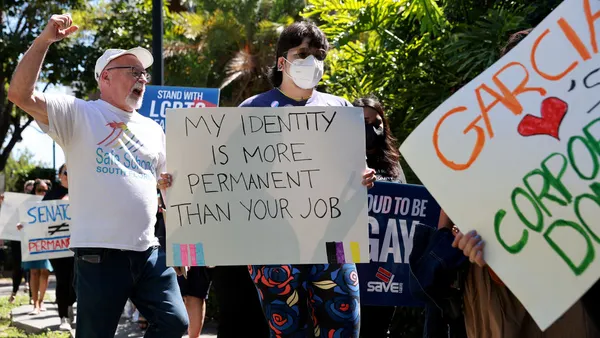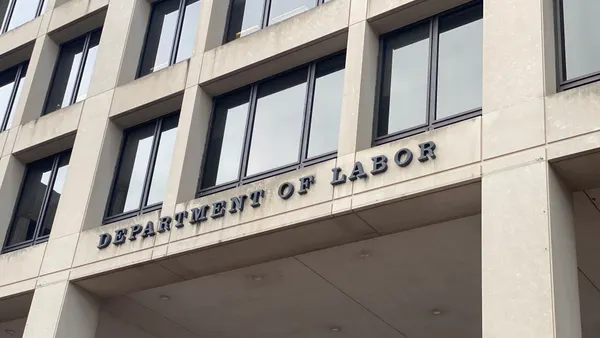Dive Brief:
- The Centers for Disease Control and Prevention announced Friday that it had adopted new metrics regarding guidelines for mask wearing across the U.S., greatly reducing the number of people who may need to mask up.
- Instead of simply case counts, the new metrics take into account COVID-19 admissions to local hospitals and percent of staffed inpatient beds occupied by COVID-19 patients.
- The CDC will now measure each county's COVID-19 spread as low, medium or high based on those metrics. Only counties measured with high spread have guidance that states all individuals should wear masks while indoors in public.
Dive Insight:
This shift "will result in most Americans no longer being advised to wear masks in indoor public settings," according to a blog post by law firm Fisher Phillips, which may prompt employers to consider their masking policies in a new light.
CDC's guidance is not binding for employers. However, since the Occupational Safety and Health Administration routinely refers back to CDC guidance regarding masking and COVID-19 policy, the CDC's stance is still "critically important," Fisher Phillips attorneys wrote. Employers will also need to ensure they still comply with local and state COVID-19 regulations.
A post by Fiona Ong, attorney at Shawe Rosenthal, agreed that OSHA guidance would likely follow CDC's lead. But employers may have individual workspace concerns that will influence their masking protocols, including number of vaccinated individuals, quality of ventilation, ability to maintain social distancing and the presence of employees at high risk of severe illness.
Employers are certainly allowed to maintain protocols that go beyond the CDC's recommendations, Ong said. Clear communication of protocol and why it is in place will be key to keeping up morale in the face of restrictions, if they are maintained. "Employers should realize that there may be resistance to stricter protocols from some employees, managers, and visitors, and be prepared to address that," Ong wrote, explaining that employers can "usually discipline" workers that don't comply with stricter employer mandates.
For employers that do drop their mask mandates entirely, they will need to ensure employees who continue wearing a mask do not face mistreatment from managers or coworkers, Fisher Phillips attorneys said. "Make sure your employees know that retaliation, discrimination, and harassment will not be tolerated, and include this prohibition in written policies distributed to all workers."













